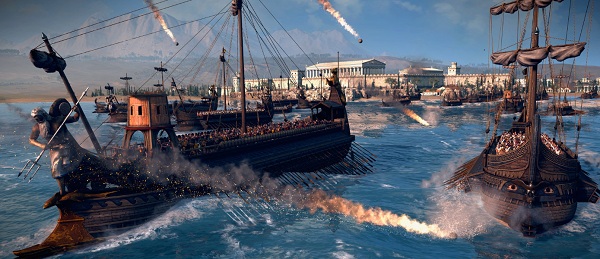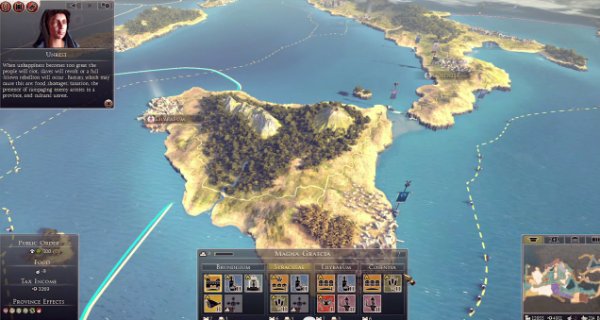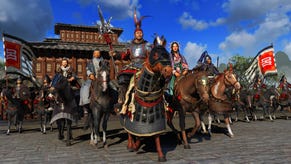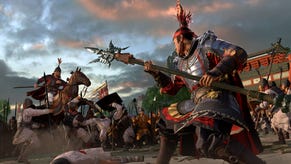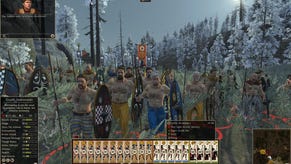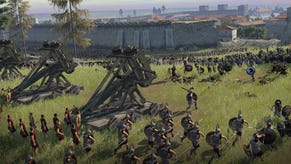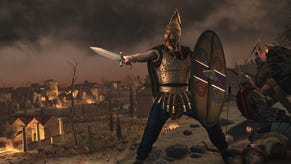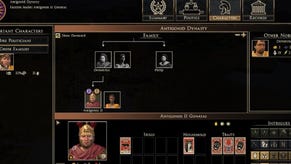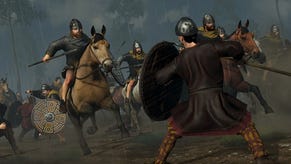Veni, Vidi, Dixi: Total War - Rome II Interview
Keeping the Rome fires burning
While in Rome, playing Total War: Rome II on the set of HBO's Rome, I spoke to Michael Simpson, Creative Assembly's studio director. What was supposed to be a ten minute sprint across a hastily reduced list of questions transformed into a longer stroll when we both realised we'd rather talk than take lunch. We begin by lamenting my ability to die in a tutorial, move on to the clash between history and Hollywood, and then discuss some fundamental design philosophies. The latter portion of the interview moves away from the specifics of Rome II to explore how Michael, and indeed Creative Assembly, consider the player's time to be their most valuable resource.
RPS: I just got killed. Well, my general did. I'm blaming a stray javelin rather than a tactical disaster.
Simpson: Oh dear. We didn't invite you here to kill you.
RPS: Oh, it's entirely my fault. It's quite nice actually. It's refreshing to fail in a tutorial, rather than feeling that absolutely everything is being done by the computer.
Simpson: We try to give freedom even in the prologue.
RPS: Almost everything I'd seen before today was the huge, spectacular historical battles, and I wonder how much all of that extra fidelity and scale really adds to the game.
Simpson: That's an interesting question. I think it actually needs to be there. It wouldn't feel right as a game set in the Roman period if you didn't have the battles with thousands of thousands of men on either side. But the smaller battles are fun as well. From a gameplay point of view, they don't have to be huge to have interesting outcomes. Some of the most nailbiting ones may be those where you only have three, four or five units, and you may be massively outnumbered, and at risk of losing something really important. That can be more fun than some of the big ones. It's about variety.
RPS: One of the things that attracts me to strategy games is how well they tell stories. With the first Rome, I had my favourite generals and there's even more emphasis on individuals this time.
Simpson: Yeah. I think we've made an attempt to make it more personal this time. Give it more of a human face. Rome was a long time ago now and what machines could do was quite limited. You had to have quite a simple set of mechanics. Now we can do more, so we do. We've done more with the personal and with politics. Diplomacy seems a lot more human.
RPS: With the politics, how much of that is going to be different each playthrough? Do situations emerge dynamically?
Simpson: Yeah, absolutely. Characters come and go. Interactions are often optional. It's up to you how much you engage with that stuff. You could get really into it and start manipulating people. It depends what you set your aim to be. If you want to become the Emperor and get rid of the Senate and have your civil war, then you can do that. But you could also play the political game to achieve a similar end. Or you could just sit there and focus more on economy than military, in which case the political side rises more to the surface, serving up the kind of things you'd expect to see. Choices that adapt to the personality of Rome.
RPS: The flavour of the era is definitely there. We have so many cultural memories and reference points for ancient Rome, without necessarily being all that educated about the reality of it. How much do you rely on the ability to tap into those cultural touchpoints and how much do you try to channel actual history?
Simpson: We sometimes have arguments about Hollywood Rome versus real Rome! It's difficult to know what to depict. Sometimes, if we actually do the real Rome, people won't recognise it. They'd think we've got it wrong. A good example of that is Roman statues. There's a marble statue over there (points). It's white. In Rome, they coloured them all in. It would have looked like Las Vegas, garish and colourful in a way that people wouldn't recognise. So in terms of things like that, we tend toward the Hollywood end of the scale. We're sat here now on the HBO Rome set and our Rome is more like that than the real Rome would have been. Hopefully we're somewhere between the two though.
RPS: I think that's often the case. There are nice accidents occasionally, when something is historically accurate but also works well, whether for film or gaming...
Simpson: Yes! I think people sometimes underestimate how much history helps us out in that respect. If you're doing science fiction or a fantasy game, you're basically inventing mechanics and troop types. You have to balance all of that. If you faithfully reproduce a start point in history, as long as you're reasonably accurate, it's guaranteed to be balanced. History is always balanced. At any point in time, the borders are where they need to be and the set up of armies is accurate. It's all perfectly balanced to allow history to happen as it did.
RPS: With that said, how much is it possible to disrupt history in this game?
Simpson: You can do that. You can play the Iceni, which is the British barbarian faction, and you can go forth and conquer Rome. In reality, that was very very unlikely. Partly because they weren't that way inclined. But you can do that. You can explore those kind of things. Set up a barbarian empire that covers the entire of the known world.
RPS: With the different cultures, do they have their own historical attitudes and approaches?
Simpson: The AIs have different personalities, so yes. We tweak those to make them tend to act historically, so there's an element of chaos in there as well. That's the best way of putting it. So depending on what their start position and personality is, they can end up somewhere quite different.
RPS: While testing, do you see things that surprise you?
Simpson: A lot. Throughout the whole series, there are points when the game comes up with tactics or approaches that you didn't think of. They can be quite memorable. I had a recent game in which an ally took one of my provinces off me without declaring war on me. And I thought, well, we didn't design that to be possible, but he'd done it by sending agents in to start a rebellion and then bribing the rebels to join his side once they had taken control. He did it in one turn. And I realised that I wouldn't have thought about doing that, realising that I was pissed off at my ally but had no in-game cause to do anything about it. That kind of stuff just emerges.
RPS: One of my favourite things is coming across something, after twenty or thirty hours with a game that I already like, and realising it's completely new. Not just a new unit or building, but something in the systems that has never happened before. Whether it's a sort of break down or an emergence. These are the parts of Rome II that people haven't had a chance to see yet.
Simpson: Yes. The campaign AI in particular is more tricksy than in previous ones. You have to watch your back much more carefully.
RPS: How difficult is it to make the campaign AI interesting, on such a large and populated map, without having the situation descend into complete chaos. A little bit of chaos is good...
Simpson: Yeah, that's true. You need a bit of chaos to remain unpredictable, because as soon as the AI becomes predictable, you just click next turn and then kill it. We end up trying to keep that chaos tamed, and sometimes it gets away from us and sometimes we control it. At the moment, it's pretty much under control, I think (laughs).
RPS: I'm in the prologue and it's kicking my ass.
Simpson: In terms of the chaos, we may have to make the prologue a little more controlled. At the moment, the AI has a habit of getting in behind you and taking the cities that you've just captured.
RPS: That's exactly what happened to me.
Simpson: Yeah, leave something unprotected and it'll straight away go 'aha!' and make a move for it.
RPS: That's a good lesson though.
Simpson: It is a good lesson! It's doing that more than previous games have. And it'll bluff and react as well. If it starts going in behind your front line, aiming for an unprotected city, and then you head to defend, it'll slip back into the fog and leave you caught between two places. You know that if you go forward it can attack, but if you go backwards, it could strike somewhere else. It's...
RPS: Cruel.
Simpson: (laughs) That side of it is pretty strong this time.
RPS: I managed to miss a naval battle in the prologue.
Simpson: You don't have to do that. It's up to you.
RPS: Well, I meant to, but ended up having to divert my ships because of the AI screwing me.
Simpson: Sorry about that.
RPS: It all worked out in the end.
Simpson: I've ended up heading down for a naval battle, seeing an attack in the north and redirecting my ships, and then being attacked at sea with all my armies loaded on the ships. It's really quite scary because with every boat that sinks, you lose an entire army.
RPS: One of the guys I was sitting next to had all of his cavalry loaded on boats and I don't think his naval assault went very well.
Simpson: Well, that's because he did a naval assault with cavalry! What was he thinking? The idea is that you land cavalry further up the coast and then bring them in as support.
RPS: Asking people to think before acting is, oddly, something that games don't always do. Even strategy games.
Simpson: It's been a bit of a nightmare for us. Before we had three or four battle types, but now we've got combined naval-land battles, and walled cities and unwalled cities. Ambushes. Armies with different stances. There's an explosion of different battle types. Which is fun. A huge amount of variety but a lot of work to make sure it all comes off right, that armies deploy in the right places and in the right stance.
RPS: All that extra computing power means a lot of extra work, I guess. How long is it since the first Rome? I forget.
Simpson: Errrrrr. Hmm. We release that around...2004? Something like that (he is right)?
RPS: Sounds about right. I was at university when it came out and it really helped with my degree.
Simpson: Sorry about that.
RPS: Did you wait to return to Rome until you thought the tech could do it justice?
Simpson: I don't know really. Each time we finish a game we spend time figuring out which one we want to do next.
RPS: There's no long-term plan?
Simpson: There isn't a long-term plan, no. We have a long list of things we'd like to do eventually, and pretty much everything you can think of is on that list, and it's just the order we do them in that we argue about. We've wanted to go back to Rome again for a while. I don't think we'll do anything with a three in it anytime soon. There are plenty of other things to do.
RPS: There's always Warhammer.
Simpson: I can't really talk about that right now (laughs).
RPS: Then that's all I will say. The tech here does suit Rome though - the sheer scale seems fitting. I was talking with Jim of Rossignol about the game after Rezzed, and saying that it's more Classical Era than just Rome.
Simpson: Yes, something like that.
RPS: I should let you get something to eat and have a break from all these questions. We have already gone over time.
Simpson: I can talk about this forever.
RPS: OK! My favourite thing about the original Rome, and Medieval in fact, which covers my favourite era, was the character interactions and the way the world remembers their actions. I'm hugely fond of Crusader Kings II and it does feel that you're moving toward a middle ground between the more narrative, role-playing approach and the battle-focused engine that has always been your cornerstone.
Simpson: Absolutely. It's interesting getting that balance right. The player's time is the most valuable resource we have, so we have to think very carefully about what we have the player spending his time doing. It's tempting to go really deep with the RPG stuff but that can end up taking too much time and you end up not getting through history and not fighting your battles. Particularly in a game like Rome, where the scope is wide and long, there are some really difficult choices to make with how deep to go with certain bits.
RPS: It's stuff you can't skip as well, I suppose. Battles can you start to auto-resolve but it's harder to do that with some other decisions.
Simpson: Yes. We start with a list of historical aspects, a long list of things that we absolutely have to get into the game. You have to have gladiators, for example, because it's a Rome game. You can't have Rome without them. There are all sorts of things like that which absolutely have to be in there. So we look at places where they might fit, for instance in those RPG elements. Some aspects don't deserve or support a mechanic of their own, so may turn up as a member of your household, or a piece of kit. There are lots of different ways to stick stuff in. It's fun doing that.
RPS: You have a checklist of everything that you want in the game and the most important part gets the biggest role - or perhaps not the most important part, but the part that makes most sense in the context of the game? It's interesting that you talk about the players' time as a resource. A lot of game design doesn't work that way.
Simpson: Well, we spend a lot of time arguing about what's important. When we give the player a decision to make, we ask 'is a real decision being made here or not?' If there's a right and wrong answer, and that's obvious, that decision is a chore. There's no gameplay in a chore like that so we try very hard to get rid of those. As the series has developed - at the beginning, you were going round to each province and adjusting tax rates and public order individually, so when you had forty or fifty provinces, it's a chore. So we gradually worked out ways of working out ways to make that easier - or less of a chore. Making the decisions more real.
I guess, there are a couple of quite big changes with Rome II in that respect. Individual regions are now contained in one province, grouped together, so you deal with them all at once as a single province. And the other thing is moving toward a flow system for things like public order, so for instance, instead of it being a case of 'if you go to +10 you have a rebellion straight away', the game now works by giving a small 'minus' every turn that you don't deal with the problem. If that adds up to -100 you get into rebellion territory and that gives you more time to adapt, to build, to react.
RPS: Making every choice important is something that a lot of designers struggle with. I was speaking to someone at Firaxis about the Civ V DLC and they were saying that a great deal of the work in the expansions is an attempt to take away the chores. To add interest. Not to replace content, but to make it interesting.
Simpson: This happens. There are always mistakes, features that sound plausible on paper but don't work when implemented. I think you can do a lot more on paper and in your head than many designers think you can. This is one of the things that I bang on about - that thing about interesting decisions and choices, for me that isn't just important to gameplay, that is gameplay. That's the heart of an interactive experience, which is a ghastly term. But you really absolutely have to be giving the player real choices to make, where the right and the wrong answer are different in different circumstances. Then the player can make a plan but different players have different routes.
When you're designing on paper and in your head, you can work out what those choices need to be, and if you get that right, they'll manifest properly in the final game. And you won't have to iterate quite as much as if you pick up a mechanic because it looks interesting, or you've seen it work in another game, and plug it in, stick some values in and realise it doesn't quite work. A lot of design is done that way and it's quite wasteful and because people have a limited amount of time, that stuff ends up in the finished game because you don't have time to revamp it all.
RPS: Making every choice interesting and an actual choice is a possible solution to the problem that a lot of strategy games have, which is maintaining interest through the endgame.
Simpson: Yes, that's absolutely true. So often it's just a mopping up phase.
RPS: Building every single thing in every single settlement. Ideally, the choices that you make when you're extremely powerful are just as complex as the ones that you make when you're struggling to survive.
Simpson: We have put mechanisms in place to make the endgame interesting, with varying degrees of success, throughout the series. The civil war mechanism, for instance, which forces you to challenge for total domination. We don't always get things right and we're certainly not perfect, and making every choice interesting is incredibly difficult.
RPS: Different people find different choices interesting, for one thing.
Simpson: Yes. And making complex things simple is very difficult as well. We put a lot of effort into that and hopefully we get better every time.
RPS: Thanks for your time.
Total War: Rome II is out on September 3rd. My hands-on preview is just over there.



